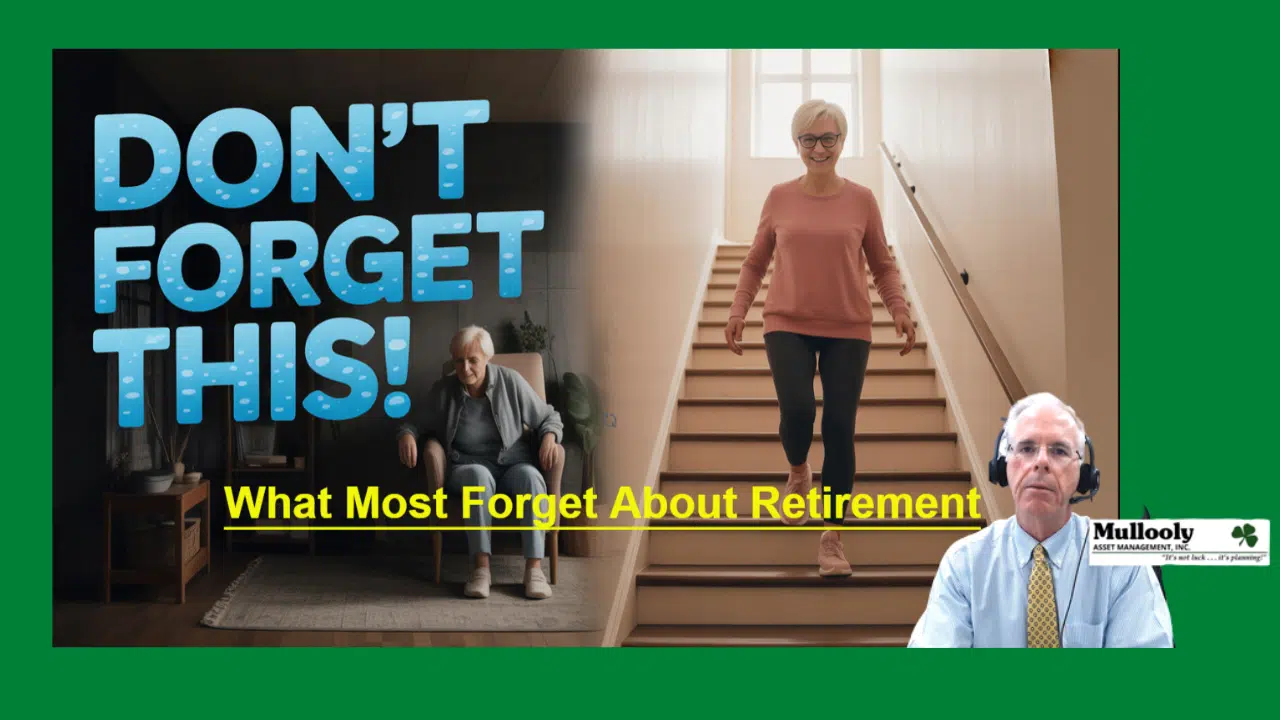Preparing For Retirement – What Most People Forget About Retirement
Takeaways:
-
Retirement success depends on more than just the math. Your physical and mental well-being matter.
-
Nearly 30% of adults over 70 struggle with basic mobility. Don’t let poor health limit your retirement.
-
The transition from work to retirement can be emotionally bumpy. Plan for identity shifts and purpose.
-
If your advisor isn’t talking about these issues, you might be missing the full picture.
Preparing For Retirement – What Most People Forget About Retirement – Links
Catch all our Mullooly Asset videos here
Subscribe to the Mullooly Asset YouTube Channel
Watch this episode (“Preparing For Retirement”) on our YouTube Channel
NIH / National Institute on Aging report
Preparing For Retirement – What Most People Forget About Retirement – Transcript
I want to cover a few points about retirement that aren’t necessarily about math.
And if you are just speaking with your advisor about making the math work, you may be missing some parts of the discussion that ultimately are really important.
One of the things that comes up a lot is “hey, I just don’t get around as well as I used to!”
This is a fact.
As people get older, they have trouble getting around.
I don’t know if it’s just age-related… or if they’ve just spent their entire life sitting around watching Wheel of Fortune.
I don’t know the answer to that.
But here’s something I saw from the National Institute of Health. 30% of adults over the age of 70 have trouble with things like walking, getting up out of a chair and climbing stairs.
In fact, the average 75-year-old American, male or female, has trouble… struggles getting up from a chair. What? What in the world?
So look –
Being out of shape,
Being overweight, and
Not getting enough sleep…
You are hurting yourself by doing this.
You want to have a long retirement!
You worked a long time.
You should be retired a long time!
You deserve this.
You’ve worked your whole life for this!
I… just speaking for myself… I graduated from college in 1983.
And within a few days I started working at EF Hutton. That was 1983.
That was 42 years ago. And I’ve been sitting at a desk ever since.
But I can tell you that I’m not going to be one of those “average 75-year-old Americans who struggles getting up from a chair.”
You’ve got to take care of yourself. Because you want to be retired a long time.
So again, these are things that are, aren’t just about “making the math work.”
Let’s talk about money. You are going to miss the paycheck, for sure, once you retire.
But you are also going to miss some other things.
You’re gonna miss the mental stimulation that comes from “doing the work.”
You’re also going to miss the social interaction, the social connection that you have – from working with other people, whether they’re clients, customers, or coworkers.
You are going to miss that.
And so if “work is your life,” you need to work on some other things to – outside of work – so that you do have some type of mental stimulation; some type of social interaction.
Loneliness is a very big deal and we talk about that a lot with our clients.
Not having mental stimulation.
Not having social connections.
Being lonely.
These are problems that a lot of retirees face.
And this is… you can’t find that on a spreadsheet.
You can’t find that in the math.
One of the other things we’ve found, in speaking with our clients, is the whole transition “from work” into “non-work,” or into retirement: it’s not going to go as smoothly as you think.
It’s going to be a little bumpy until you find your new role, your new identity.
So give yourself some patience, give yourself… treat yourself with some grace, about transitioning into retirement. Because it’s not going to go as smoothly as you as you may think it will.
A lot of times when we’re talking with our clients about preparing for retirement… it’s not always about “making the math” work.
Yeah, that’s a huge part of, of preparing for retirement is making sure the number, the math checks out.
But these are topics that we’re talking about with our clients, our friends.
So a question for you. Is your advisor talking about these topics with you, too?
Thank you for watching preparing for retirement – what most people forget about retirement








